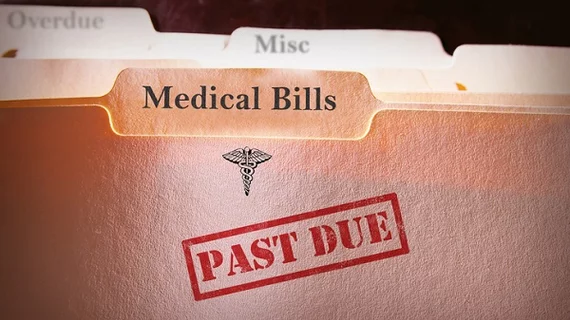Providers prevail in 77% of No Surprises Act payment disputes, new CMS data show
Radiologists and other physicians are prevailing in nearly 4 of 5 No Surprises Act payment disputes, according to new data from CMS released on Feb. 15.
In the first six months of 2023, providers and healthcare facilities won about 77% of disputes where a determination was made involving out-of-network services (out of over 78,000 cases).
The American College of Emergency Physicians—which has partnered with the American College of Radiology on NSA issues—released a breakdown of the data on Friday. It noted that only 10% of eligible claims are estimated to go through arbitration, but the impact on payment rates is profound.
“Insurers are underpaying providers based on a qualifying payment amount formula that’s invalidated by federal courts. So, paying you less while charging patients and employers more,” ACEP said in its Feb. 16 analysis.
A small number of parties or their representatives initiated most disputes in the first half of 2023, CMS reported. In fact, the top 10 initiating parties represented about 78% of all disputes, including large practice management companies, medical groups or revenue cycle management entities. CMS said the top three initiating parties in 2023 included SCP Health, Team Health and imaging industry giant Radiology Partners, altogether covering 58% of disputes.
“Increased dispute submissions from these top initiating parties in 2023 contributed to the overall increase in dispute volume in the first six months of 2023,” the agency noted.
Certified independent dispute-resolution entities rendered payment determinations in 83,868 disputes in the first half of 2023. That’s more than five times the number of determinations made in all of 2022 (at 16,238). Emergency (58%) and radiology (17%) services made up most non-air ambulance payment determinations. Health plans and issuers were the prevailing party in about 23% of cases.
ACEP noted that these data represents a “small subset” of the total amount of out-of-network claims and only those that went through the IDR process. Many more were never even disputed.
“Premiums have gone up consistently prior to NSA so suggesting it as cause for premium change is premature at best,” ACEP said. “Insurers continue to post record profits while premiums continue to increase—pre and post NSA.”
CMS also reported that the prevailing offer was higher than the qualifying payment amount in about 82% of payment determinations. Given that physicians or facilities prevailed in 77% of payment determinations, the median prevailing offer often came from the provider side, ACEP noted. Richard E. Heller III, MD, MBA, with Radiology Partners, believes the data are proof that providers are using the IDR process properly.
"Hopefully, future rulemaking will incentivize insurers to contract reasonably or make fair, market-based initial payments so that medical practices do not need arbitration," Heller, who is RP's associate chief medical officer for communications & health policy, told Radiology Business Tuesday. "In the meantime, while the backlogs remain a concern, the departments [of HHS, Treasury and Labor] have made strides to improve system efficiency and capacity."
The American College of Radiology said Tuesday that it was still reviewing the data and could not yet provide comment.
You can read much more in the release from CMS here, along with the American College of Emergency Physicians’ breakdown here and our previous coverage of the NSA at the links below.
Editor's note: This story has been updated to include a comment from Radiology Partners.

